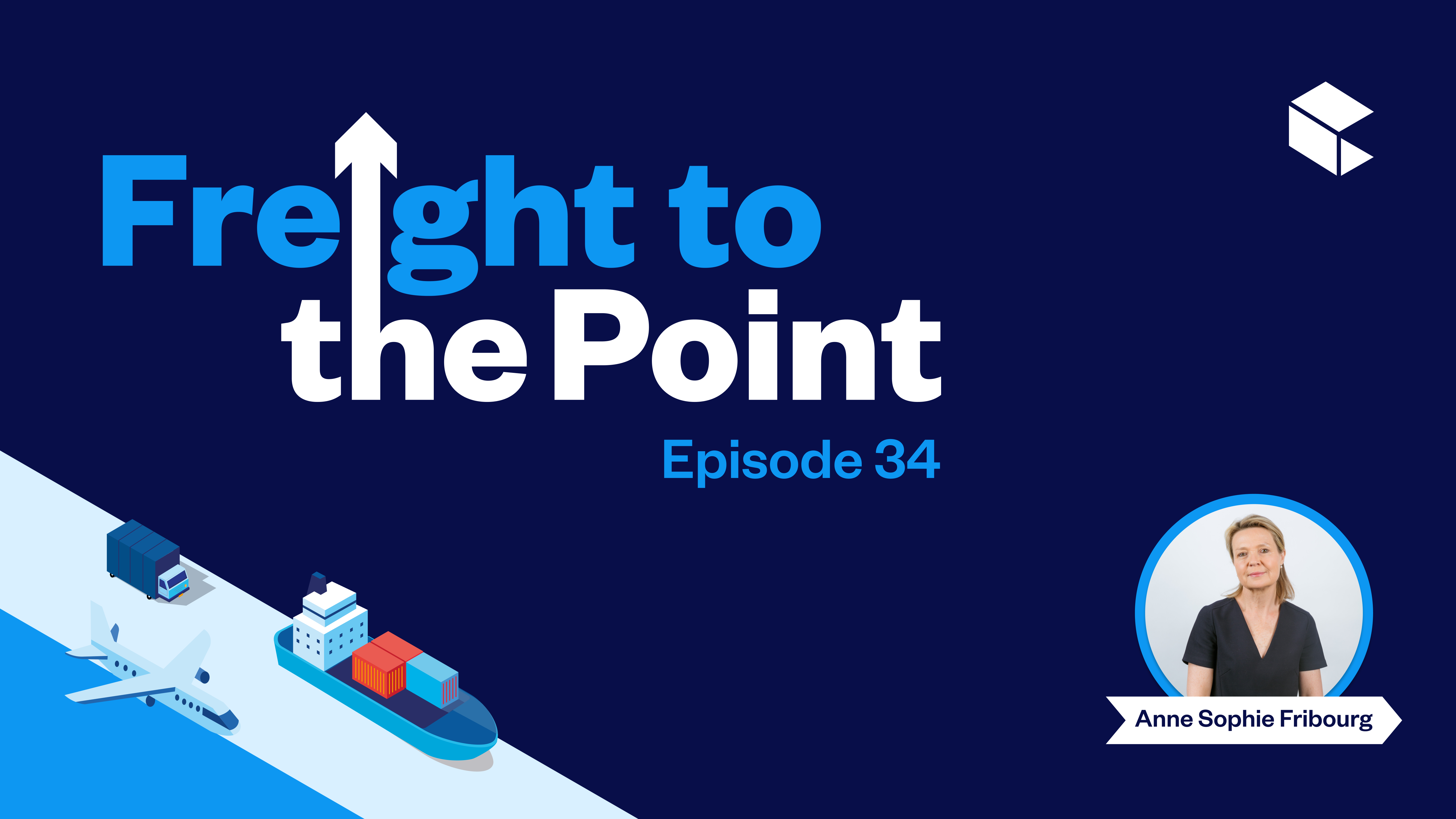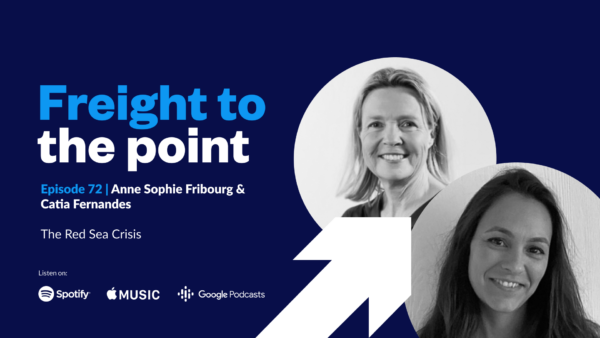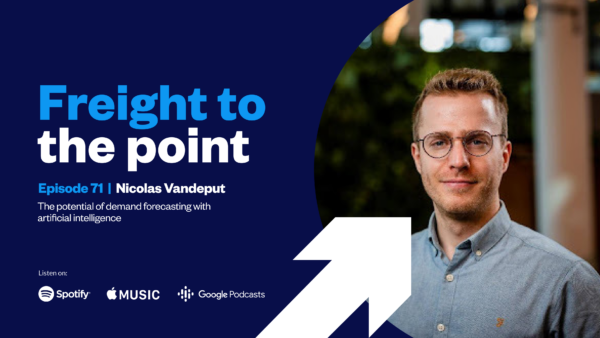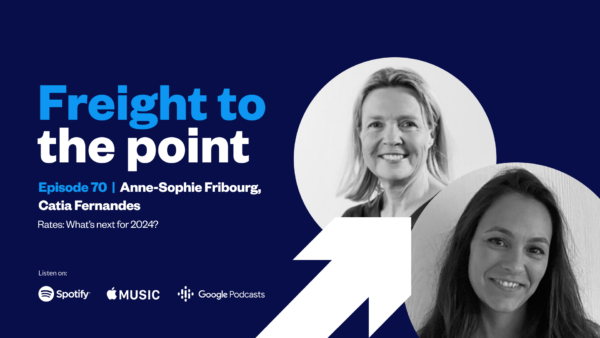Episode 34:
Our big questions for 2023
See all episodes

How will shipping alliances change next year? Will we see a change in carrier behaviour? Will annual contracts play a big role in 2023?
These are some of the questions we asked Anne-Sophie Fribourg, VP of Ocean Procurement at Zencargo. For this week’s episode Anne-Sophie sat down with Alex to answer some of the big questions we had for 2023.
They cover:
- How will capacity affect the market next year?
- Will we see a shift in carrier and shipper behaviour?
- How will the rate market play out next year?
- Will sustainability impact shippers and carriers in 2023?
Anne-Sophie Fribourg
Anne-Sophie has over 20 years of experience in the freight forwarding industry, having worked in Singapore, the Middle East region and France for a French freight forwarder. At Zencargo, Anne-Sophie leads the ocean team to obtain the best rates and space and build supply chain resilience for our customers.
Resources
 |
Alex Hersham: Hi everyone and welcome to another episode of Freight To the Point. I’m Alex Hersham and today on this very cold day in the office in London, I am joined by Anne Sophie Fribourg out of Paris, our Vice President of Ocean Procurement in Zencargo. Today we’re going to be asking some of the tough questions for 2023, such as what is next for the alliances? How will new capacity affect the market? Will sustainability still play a big part in supply chains, and many more questions. Anne Sophie, welcome. This isn’t your first time on Freight To The Point, I believe, but it’s your first time with me. |
|
Yes, it’s my first time with you. Very happy to share all these ideas with you.
|
 |
 |
Ah, you are the expert so I’m really looking forward to it. Anne Sophie, maybe in a few words you can just give the audience a little bit of your background because it always impresses me when I hear it, so I’m sure they would love to hear a little bit and then we’ll jump right into questions. |
|
Of course. So I’m now in charge of Ocean Freight Procurement with Zencargo since a few months, and I used to work for a French freight forwarder called Bollore Group for 20 years, having an experience in sales development in the Middle East, and then development also in the Indian subcontinent, and then I moved to procurement dealing with shipping lines on a worldwide basis, and joining Zencargo will allow to get a better approach, a new approach to our activity, our industry. I think it’s a very exciting journey to combine procurement expertise with the technology which is key for tomorrow to continue to have a non-destructive supply chain.
|
 |
 |
So Anne Sophie, let’s jump right in. The alliances, the big three, are we going to see a split in any of these alliances? |
|
You know that alliances are not new ones? Just to give a bit of history, alliances were created in the 1990s to cope with a new environment. Really, the idea of the alliances had been to cover better geographical routes to conquest new markets and also to be able to minimise the operational cost, which has been very true after 2008 when market became extremely tough and challenging on the East-West market. So these three alliances came in the picture in 2016. They will probably remain, because we are going to be in 2023 in a market with low demand and shipping lines will still have a challenge to minimise their cost and still be able to offer what they’ve been offering since 2016, a daily departure from Asia to a panel of destinations, which is of course very interesting for our customers. What we might see, and it is a rumour on the market, is that MSC, having ordered a large number of ships, MSC might come out of the 2M Alliance to become a standalone global carrier, but I don’t think there will be some other reshuffling from the other alliances in 2023.
|
 |
 |
That’s interesting. And obviously we don’t have an internal view because we have no information about that, but I did see that the CEO of MSC came out and said that they don’t plan on splitting now, or something to that effect, and that probably should be noted. But next year there is a lot of capacity coming onto the market. It’s been a good couple of years for the shipping line. They’ve done a replenishment cycle. We will see some of the smaller ships being scrapped, but when you scrap a 1000 teu ship and you replace it with a new build, 17 or 20,000 teu ship, just the math there doesn’t lie in terms of the impact. So how do you see it playing out with the new capacity coming on market next year? Are carriers going to delay or sideline ships? Are we hoping there’s a lot of scrapping? What’s going to happen here? |
|
There’s going to be about 8% increase in terms of capacity. We’ll have a fleet of 30 million teu. There will be more capacity coming in 2024, but what’s going to happen for sure is that shipping lines will have to rework some of their ships, efficiency of their ships, because of the new IMO 2023 regulation coming into effect beginning of January. So that will mean that they will have to withdraw a bit of capacity, though it is on the long run. So the other measure that they will implement, will probably be scrap ships, older ships, that there are quite a large number, as you said, of small ships that need to be scrapped and that will be replaced by other ships. They will also work on blank sailing. Their main objective is to have a good balance between supply and demand and the only way to monitor and manage this extra capacity coming into the market, will be via blank sailing, but we’ve seen that they’ve done that in Q4 and that has not had a big effect on the prices. So they will probably remove some loops which of course remove a large number of teus from the market and then that would remove a certain number of ships that will be gone, and they will replace them with the bigger ships coming in.
|
 |
 |
Well the first thing I’ll say to that is, in my experience, before building Zencargo I was involved in various different shipping asset classes, is that scrapping never really compensates for a huge amount of new vessels coming online, and actually you only see scrapping going up when rates really go down, and so you need a bit of that sort of period to see a lot of scrapping, although we are starting to see it now and it’s a good thing, typically, to see more fuel efficient vessels and upgraded vessels being on the market and replacing old less efficient vessels. So that’s really interesting. In terms of the capacity, it’s interesting to hear what you say about 2023 and 2024. It reminds me a little bit, not because of the amount of capacity, but this all reminds me of what happened to CSAV and the restocking environment in late 2010 into 2011, where everyone felt that the year was going to be a scary year ahead and then there was a lot of restocking, which immediately, the demand-supply balance completely rebalanced. But one thing that I think is interesting and I love your take on this is, over the past couple of years, shipping lines have bought quite a lot of secondhand ships, so they probably own a higher percentage of their overall fleet than they did even five years ago. So it feels like they have more control to take capacity out, because they own more, rather than seeing a lot of ships looking for charter on the market. So I don’t know if you’ve thought about that or if that’s going to have an impact next year. |
|
That could have an impact and that’s exactly what MSC has done. MSC had a lot of chartered ships and they are now going away from their contract with the chartering companies to have their own ships, which enabled them to show much more agility on the market. I would say that the alliances also contribute to more agility on the market in terms of removing ships or adding ships, because when of course you have several shipping lines on the same ship, it’s much easier. They take a decision very quickly to remove ships. Yeah.
|
 |
 |
So if you are a shipper next year, if you’re an importer or customer, do we think that we’re going to see much more moving towards a spot market mentality next year or a index linked mentality? Are annual contracts still going to be a big thing? We’d love to hear your thoughts and also what you’re seeing.
|
|
I think we’ve seen a lot of shippers moving to the spot market already since a few months and that is really the movement that we have seen recently. I think that we have reached the bottom in terms of rate level.
|
 |
 |
Calling the bottom. I love that. I love that. Really going for it.
|
|
I think it’s a good time to lock in deals on a longer term. I mean, there is a lot of uncertainty for the future, even in the coming months. We have not seen any peak in December. We start to see a small peak now and we’ve seen some shipping lines putting some significant increase in the rates for January. Some are not doing it, so it’s very unpredictable. I think that there will still be a lot of long-term contracts because it is a way for shippers to get visibility, to plan their budgets and being in the spot market can last for a while but you cannot build up a resilient supply chain while working on the spot market. So I think it’s not something we’re going to see because we’ve reached the level we are at now today.
|
 |
 |
Well to everyone listening to this, you heard it first here. Anne Sophie is calling the bottom of the market or near the bottom of the market. It’s a good time to procure. I agree. Long-term rates allow for long-term partnerships and allow for more predictability. So I think that’s very interesting. But I do have to keep on saying this point, why have we seen rates go down so quickly? It’s because of two reasons. Number one, there’s more effective suppliers, port congestion unwinds. I think everyone knows that. But number two, because we’re going through a period of destocking and destocking cannot last forever. It just can’t. People need inventory. Inventory is the lifeblood of these businesses. So the more pain that’s happened over the past couple of months in terms of inventory destocking and reduction in demand, actually the better the outlook comes for Q2, Q3 next year as inventory levels go back down to normalised levels as we’ve been seeing with the parallel retailers across both sides of the continent.
So it does make me actually quite positive for the second half of next year and really from the middle of the second quarter, which I think makes your advice about lock in now, try and have good relationships and good deals now, even better advice. So I think that’s really, really interesting. In terms of digitisation and the role of technology, you’re biased because you work with us so of course, there’s your views there, but what are you hearing in terms of areas of potential further digitalisation, what customers are thinking, what carriers are thinking? How are you seeing this going into next year?
|
|
As I said, I think there are several things. I think that there is what the carriers can bring on the market and it is true that they are going into that digitalisation very strongly, all of them, and we have to, of course, consider that. I would say that without digitalisation, without predictability, without visibility today, it is very difficult to overcome the current environment. I would say that it is extremely important to build up some resilience, and resilience will come only with data, with what the technology can bring us, which is really monitoring all the black swan events, all the disruption that can happen and by connecting all the stakeholders on the same platform, which is what Zencargo is doing, and that enable us to predict, to manage risks, and there will still be a lot of risk, and to be resilient, and to be able to foresee any disruption that might happen in the journey.
That has also to be linked with commercial datas, and this is why I think we can really, with our tools, help our customers to anticipate. Shipping lines are looking for customers who are attractive to them because they are able to provide accuracy of forecast. This is because shipping lines are investing in ships. They have to be able to plan what will be the utilisation ratio on the voyages from Asia to the UK, for example. They have to know exactly how much they are going to ship and this is something that is essential for the business model and this is where we can bring value. This is what we can build with our customer to bring value to the shipping lines and then to really build up a proper planning and proper execution of the purchase order with the planning we going to have on the ships.
|
 |
 |
Well that’s why I love purchase order management so much and I think next year it’s going to be as important as ever, and I sound like a bit of a broken record saying this, but purchase order management gives the company better visibility. It gives their teams better understanding of what SKUs are arriving when. It gives you better forecast for the shipping lines, you become a better partner, and it reduces origin dwell times. We see that in our data of customers. The majority of our customers use order management, but the customers that use order management versus the customers that don’t, and the delta there in terms of origin dwell, it always plays in the favor. So a faster supply chain and more dynamic supply chain, a better partner, the more you leverage technology for order management. I completely agree.
Okay, moving on a little bit to destocking. I mentioned this before and the potential for restocking. I’m hearing a lot of businesses say that they’re being cautious for Q1. They want to manage their cash flows; they want to manage their inventory levels. That makes me think more and more like businesses might think about restocking, or at least reducing the destocking, come Q2 and then maybe might even get short of inventory. How are you seeing this from companies? Are they changing their forecasting strategies? How are businesses thinking about this?
|
|
I think they start to change their forecasting strategies. What we’ve seen is that even the sophisticated companies have been working more in a, I would say a reactive way, by having stop and go with the management of their stocks, which of course is not bringing any value. So I think they are working now on a model where they will forecast better and they will forecast better with our help. I mean, I think that this is where we can really bring value by adding some knowledge and adding some visibility, I would say, to the restocking by sharing information, by sharing data and by working at a SKU level, as you said earlier.
|
 |
 |
Let’s move on to sustainability, though, because I know this is close to your heart; it’s close to my heart. We’re starting to see, and we’ve seen carriers offer more environmentally friendly, let’s say, offerings in terms of fuel efficiency, in terms of alternative fuels. Do you see this happening more? Do you see customers paying for this because the surcharges are high but arguably it’s a good thing to do? How do you see this playing out, and how do you think forwarders should be offering sustainability as part of their core value to customers?
|
|
I think there is a big change in the society, of course, towards sustainability and a big change in our industry to minimise carbon emissions. It’s, I would say, an overall objective of the industry and of all the stakeholders. Shipping lines have been struggling to find solutions, to find new, alternative fuels, to be able to offer them to the market. I remember talking to Maersk a few years ago and they were making a lot of research to know what would be the best adapted green fuel. They are talking of having sails on the container ships in order to reduce carbon emission. There’s a lot of thoughts and a lot of difficulty also because the supply of fuel is not obvious everywhere, and this is where also there is a big problem for the shipping industry and how are they going to have enough supply for the fuel they are looking out, that will be the ones that will be able to save carbon emissions.
So we see that they’ve been improving, they’ve been improving by offering solutions. We are not yet, I would say, at a level that will enable us to reach the global objective, but I think sustainability is key for all of us and it should be, and we are doing it with Zencargo, but that should be one of our core product that would be offered to the customers. It is true that shipping lines will probably have an upfront fee at the beginning that will be passed to the market and I think this is something, we’ve seen it already with some of our products that we are offering that we do with one of our partners where we offer a saving of, let’s say, 25% when it’s LNG offer, when it’s a biofuel offer, it’s a saving up to 85% of carbon emission, but it is still a charged a fee on the market.
But I think we should not think short term. We should think long term and sustainability will be key towards more efficiency, more operational efficiency and I would say that in the long run, we will become more efficient, and it’s a way to reach our objectives and to be more performant, more resilient, on the market.
|
 |
 |
Well I love that. I love the long term thinking and if I wrap it up on what is a very cold day in London today, and so I’m so glad that we’re able to do this and re-energise. Some of the things that I’ve heard from you today is that alliances aren’t a new thing. We’ll see next year what happens. Actually, alliances help capacity management. There is a good amount of capacity coming online next year, 8% or so, but through different mechanisms and potentially through restocking in particular in the back half of the year, we might see decent capacity alignment. We’ve seen a lot of blank sailings recently. We might see loops being removed. All these things talk more and more about strategic partnerships because what it means is that next year is not going to be a straight line. It means that whether it’s the rates or the service quality or the ability to move cargo or the ability to switch from destocking to restocking, things are going to change next year.
People have to stay agile and you made the point around leveraging technology to stay agile, the value of order management, the value of a collaborative supply chain. And then you spoke passionately about the need for the focus on sustainability, the things that you’ve seen over the past 10 years and where we’re heading towards, and that was all very close to my heart and many at Zencargo. So listen, thank you very much, Anne Sophie, for joining us, for imparting some wisdom.
|
|
Thank you.
|
 |
 |
To everybody, thank you very much again for joining another episode of Freight To The Point. This is the last episode of the year of 2022 and we want to thank all our listeners for engaging. Please remember to like, subscribe and all the other fun things you can do, and we look forward to seeing you in 2023. Thank you very much, Anne Sophie, once again. |

Episode 72: The Red Sea Crisis
In the latest episode of Freight to the Point, we’ve featured our most rec...

Episode 71: The potential of demand forecasting with artificial intelligence
In the most recent instalment of Freight to the Point, Lucie Phillips, Zen...

Episode 70: Rates: What's next for 2024?
As we prepare for the year ahead, it's crucial to consider the three pillars...

